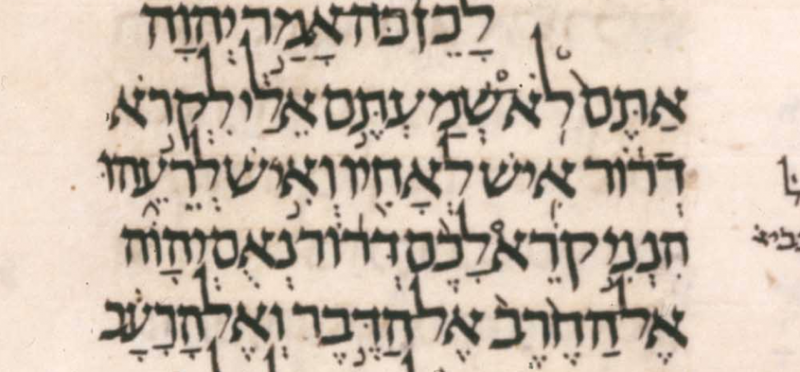Jeremiah Chapter 34
34:18 …I will make them like the calf that they cut in two and passed between its parts…(Jeremiah 34:18 ESV) This likely refers to the process during certain covenants where animals were cut into pieces and participants walked between them as a sign of ‘this type of thing will happen to you if you break the covenant’. The idea is that Judah has consistently broken it’s covenant with YHWH by not practicing Sabbath-Year and Jubilee-Year commandments to release fellow Israelites from their bond-servanthood, and that most recently they have broken that covenant extremely by releasing then taking back their fellow-Israelites as slaves, a double crime.
Also to note: There is no record of Israelites walking between pieces of animals in this manner as a part of the covenant ceremony. This may be a reference to Abraham walking between the animals in Genesis 15:7-21, as the beginning of the covenants YHWH made with Abraham and his offpsring, and is dyadically applied to the Israelites themselves, where in Abraham all of his offspring are seen to be participating in the covenant. This is common in scripture and can even be seen in the New Testament where in Christ we all participate, by faith, in the New Covenant of God.
Here are a couple of examples of Ancient Near Eastern covenants where this usage of animals as representations of covenant partakers is given:
Eighth century BCE treaty between Bar-gaʾyah and Matiʾel from Sefire:
“[Just as] this calf is cut in two, so may Matiʾel be cut in two.”
from: The Context of Scripture, 2:82:214, citation found in the Zondervan Illustrated Bible Backgrounds Commentary)
and
8th century BCE treaty between Assyrian King Ashurnirari V and Matiꜥilu of Arpad
This head is not the head of the lamb [used as part of the covenant ritual], it is the head of Matiꜥilu, it is the head of his sons, his officials, and the people of his land. If Matiꜥilu sins against this treaty, so may, just as the head of this spring lamb is torn off, and its knuckle placed in its mouth, [ … ], the head of Matiꜥilu be torn off, and his sons [ … ].
from: (Ancient Near Eastern Texts Relating to the Old Testament, 532, citation found in Zondervan Illustrated Bible Backgrounds Commentary)
Jeremiah 34 In General
This is a brief but hard chapter, lacking in the hope that is in the previous chapter (and remember, chapters were added much later, so that isn’t really a break in Baruch’s original scrolls containing Jeremiah’s prophecies). This chapter is about YHWH’s judgement, a harsh one, upon the people of Jerusalem and Judah. The final siege and destruction of Jerusalem by Nebuchadnezzar was brutile, captured painfully by the words found in the book of Lamentation. When Jeremiah was called, YHWH told him he would tear down and build up nations. The hard and painful reality for Jeremiah, both in terms of his persecution by his own people and his inner anguish, is that the nation he was called to tear down was his own: Judah. Though the promise of hope was clearly present in other of Jeremiah’s prophecies, the suffering that was present and coming true even at the uttering of these words must have been overwhelming.
For historical context, it is important to remember that all of King’s Josiah’s sons (and grandson) had been under the power of larger empires: Egypt and Babylon. Zedekiah himself was appointed (and even given his name) by Nebuchadnezzar to be king following Babylon’s defeat of Jehoichin, Zedekiah’s nephew who had preceded him as king. This appointment, which took place around 598/597 BCE is recorded in 1 Kings:
And the king of Babylon made Mattaniah, Jehoiachin’s uncle, king in his place, and changed his name to Zedekiah. Zedekiah was twenty-one years old when he became king, and he reigned eleven years in Jerusalem. His mother’s name was Hamutal the daughter of Jeremiah of Libnah. (2Kings 24:17–18 ESV)
This appointment is also recorded in Babylonian records:
…in Kislev the king of Babylonia called out his army and marched to Hattu. He set his camp against the city of Judah [Ya-a-ḫu-du] and on 2nd Adar he took the city and captured the king. He appointed a king of his choosing there, took heavy tribute and returned to Babylon.
THE BABYLONIAN CHRONICLE (1.137), The Context of Scripture, vol. 1, p. 467
Eight or nine years after his appointment as king, Zedekiah rebelled against Nebuchadnezzar and ceased to pay tribute. This ultimately led to the 30-month siege of Jerusalem and the defeat and exile of Judah. From a theological perspective, this destruction and exile was due to Judah’s injustices towards the poor, the oppression of their own people, the failure to keep the covenant (especially in regards to Sabbath and Jubilee), and idolatry.
